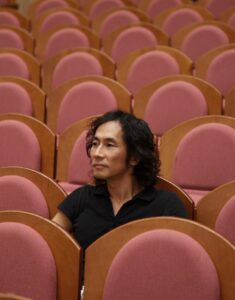 ©Michiharu Okubo
©Michiharu Okubo 1965年9月6日東京都生まれ。少年期にメシアンとバッハの音楽の強い影響のもとに作曲を始める。また、この頃欧米のキリスト教文化に触れ、高校卒業後にカトリックの洗礼を受ける。桐朋学園大学音楽学部作曲科を経て、90年同大学研究科修了後、DAAD奨学生として、フライブルク音楽大学現代音楽研究所に留学。91年よりIRCAMでコンピュータ音楽を研究。94年よりイタリア・カステロ市の芸術奨学金を得て同地にて研修。作曲を末吉保雄、K.フーバー、S.シャリーノに、コンピュータ音楽をP.マヌリに、オルガンをZ.サットマリーに師事。
95年~99年渋谷ジァン・ジァンにおいて原田敬子と「東京20世紀末音楽集団演奏シリーズ/→2001」を、97年~99年神奈川県立音楽堂において「権代敦彦シリーズ・21世紀への音楽」を制作。
カトリック教会のオルガニスト、桐朋学園大学作曲科非常勤講師(95年~)もつとめている。
日本音楽コンクール作曲部門第1位(1987)、V.ブッキ国際作曲コンクール第1位(1991)、セロツキ記念国際作曲家コンペティション第2位(1992)、バーロウ基金作曲賞(1993)、芥川作曲賞(1996)、出光音楽賞(1996)、中島健蔵音楽賞(1999)、芸術選奨文部科学大臣新人賞(2002)、尾高賞(2016)等。近作に、大教大附池田小無差別殺傷事件を鎮魂するメゾソプラノと管弦楽のための《子守歌》(2005)、東日本大震災を追悼する5奏者のための《クロノス ―時の裂け目―》(2011)/ピアノのための《カイロス―その時》(2011)/ピアノのための《指の呪文 Op.135》(2013)/児童合唱とオルガンのための《iki・iki》(2017)、セウォル号沈没事故を追悼するヴィブラフォン協奏曲《セウォル~海から》(2018)等。
Atsuhiko Gondai was born in 1965 in Tokyo. He studied composition at Toho Gakuen School of Music, and from 1990 to 1992 attended the Staatliche Hochschule für Musik Freiburg as a DAAD scholar. From 1993 to 1994 he was resident in Paris as a researcher in the Japanese Government Overseas Study Program for Artists, and until 1995 studied computer music at the Institut de Recherche et de Coordination Acoustique/Musique (IRCAM). He studied composition with Yasuo Sueyoshi, Klaus Huber and Salvatore Sciarrino, computer music with Philippe Manoury, and organ with Zsigmond Szathmary.
In addition to taking 1st place in the 1991 Valentino Bucchi Composition Competition, 2nd place in the 1992 International Composer’s Competition “Kazimierz Serocki,” and receiving the Akutagawa Composition Prize in 1996, he was selected for the 1992 International Gaudeamus Music Week in Amsterdam and the 2001 ISCM World Music Days in Yokohama, and has been awarded numerous other prizes at home and abroad.
From 1995 to 1999, he has produced the concert series for the contemporary music and for his own works in Tokyo and Yokohama. In 2004, he has organized “Transmusic Concert series in Osaka No. 2” by Suntory Foundation for Arts, as the theme composer, with Video artist Akihiko Kaneko as the special guest. Additionally, he stayed in Bergen, Norway as an Artist in Residence in 2003 and served as the Composer-in-Residence at Orchestra Ensemble Kanazawa from 2004 to 2005.
In 2007, jhapetā –funeral music–, commissioned by Sendai Philharmonic Orchestra, was premiered and earned a good reputation. In 2010, he was featured in some of the innovative concert series for contemporary music, such as “Music of Today (MoT)“ presented by Philharmonia Orchestra at Royal Festival Hall in March, and Decathexis, co-commissioned by Saito Kinen Festival Matsumoto and Carnegie Hall, was premiered in Matsumoto as part of the festival in September and at Carnegie Hall in December by Saito Kinen Orchestra conducted by Tatsuya Shimono.
In October 2013, he was featured “A Profile of A Composer“ presented by Suntory Foundation of Arts, whose program included the premiere of Dead End for organ and orchestra. In 2014, Utopia –nowhere–, commissioned by NHK Symphony Orchestra, was premiered at “Music Tomorrow 2014“ presented by the Orchestra. In 2015, his first wind orchestra piece Time No Longer, commissioned by Tokyo Metropolitan Theatre, was premiered in March, Vice Versa, commissioned by Orchestra Ensemble Kanazawa and Falling Time to the End, commissioned by Frankfurt Radio Symphony, were premiered respectively in July and in November with great success. He was awarded the 64th Otaka Prize for Vice Versa in 2016.
In January 2014, his first opera Sakurų Prisiminimai was premiered at Kaunas State Drama Theatre in Lithuania. The opera which describes Chiune Sugihara, who was a Japanese diplomat worked in Lithuania and saved a lot of Jews during World War II by helping them leave the country, attracted considerable attention. It was broadcast live by LRT (Lithuanian National Radio and Television) and received a standing ovation for every performance.
He has engaged in many collaborative projects with filmmakers, dancers, choreographers and architects, such as MERZBOW (noise music), Cloud Gate Dance Theatre of Taiwan directed by Lin Hwai-min, Akihiko Kaneko (video artist) and Jo Kanamori (dancer, choreographer).
In recent years, the relationship between “death, eternity, and infinity” and “limited life, and limited music” has been set as his central theme, and though based on Catholicism, he attempts to create musical time through his own unique religious view on life and death. He also serves as an organist at the Catholic Church in Tokyo.
(as of 9 December 2016)